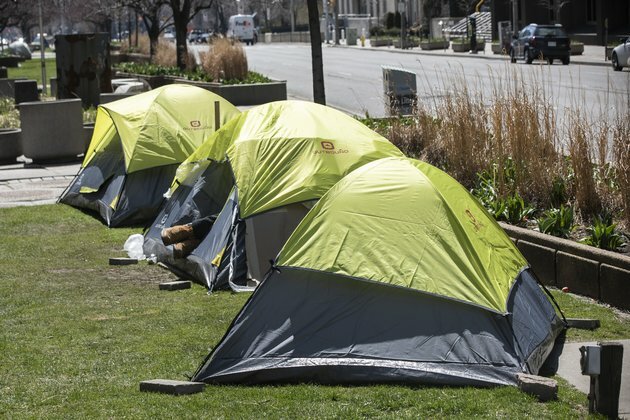Ontario's Safe Streets Act will cost lives amid the coronavirus pandemic
The Conversation
23 Apr 2020, 20:09 GMT+10

As the COVID-19 pandemic continues, officials in many Ontario cities have moved to protect the homeless population. At the same time, police are still enforcing the province's punitive Safe Streets Act against people surviving on the street. This enforcement must stop if we are to avert a public health catastrophe.
Homeless people are at profound and immediate risk. Researchers at the University of Pennsylvania have found that when homeless people are infected with the virus, they are twice as likely to be hospitalized, two to four times as likely to require critical care, and two to three times as likely to die than the general population.
The report warns that it will take US$11.5 billion to manage the spread of COVID-19 among the homeless population in the United States alone.
The spread of the virus to homeless communities in Ontario could be disastrous to the homeless and the housed alike, given the strain that medical facilities are under. Underfunded and overwhelmed, many of the emergency shelters opened across Canada still lack basic counter-measures such as social distancing, self-isolation and proper hygiene protocols.
States of emergency issued by the province and communities, big and small, put into sharp focus the obligation of governments to protect vulnerable people and those who care for them. The inclusion of homeless shelters and drop-in centres as essential services and the prohibition on the eviction of rental tenants are important first steps.
The Ontario government must, however, go further to protect homeless people. Attorney General David Downey should immediately instruct all Ontario police services to stop routine enforcement of the Safe Streets Act.
A cruel and unjust law
Enacted by former Ontario premier Mike Harris's Conservative government in 1999, the Safe Streets Act was part of a trend across North America to criminalize homelessness and visible poverty.
While ostensibly about protecting pedestrians and vehicular traffic, the law is so broad and vague that it targets homeless people who, by their simple presence in public space, are considered to be breaking the law. In its intent and effect, the Safe Streets Act is the continuation of archaic vagrancy laws that have for centuries punished and stigmatized people for being visibly poor.
Shortly after the legislation was passed, charities across Ontario feared they would be infringing the act by carrying out ordinary charity solicitations in public spaces. Collections carried out for charities by groups such as university students during frosh weeks and Ontario firefighters were cancelled.
The government responded by amending the Safe Streets Act to exempt registered charities. The amendment demonstrated something that the attorney general should now consider: When the public good is at stake - in this case the lives of homeless people and the wider public - the government can act decisively to curtail the use of a bad law.
With COVID-19 threatening us all, the consequences of the enforcement of this type of anti-vagrancy law threatens more than the lives of homeless people. It now represents a direct obstacle to meaningful containment of COVID-19 and counter-measures that must be implemented to save lives. At this stage of the pandemic, it's unclear that police are willing to take anything other than a crime-control approach to homeless people in public spaces.
Safe Streets Act enforcement will cost lives
Police enforcement of the Safe Streets Act means laying charges, which brings homeless people into courts. Enforcement also encourages the homeless, in trying to avoid police sanctions, to seek out less visible and more risky settings for themselves, making it difficult for outreach workers to find and help them.
Being charged and fined only adds to the economic hardship endured by homeless people, pushing them further into the criminal justice system and further away from getting off the streets.
Even without a global pandemic, the Safe Streets Act worsens already life-threatening trauma for women who are homeless because they are fleeing intimate partner violence, for LGBTQ youth who see no other option than to be on the street and for Indigenous people who require culturally appropriate outreach and supports.
How the act has historically been used should now be of pressing concern to the Ontario government as it scrambles to fight the pandemic over the next year. In the first 11 years the Safe Streets Act was enforced, more than 67,000 tickets were issued, resulting in more than $4 million in fines. The fact that only one per cent of these fines has ever been paid highlights the futility and absurdity of enforcing this law.
Police officers are integral front-line workers during this extraordinary crisis. They should be encouraged and empowered to act as protectors of the vulnerable, not as persecutors of people forced to survive in public spaces.
Ontario's attorney general has the opportunity to show that his government truly values the lives of all citizens, including poor people, during this pandemic.
He must stand down on the enforcement of this cruel and dangerous law.
John Sewell, a former mayor of Toronto, co-authored this article. He is a co-ordinator of the Toronto Police Accountability Coalition.
Authors: Joe Hermer - Associate Professor of Sociology, University of Toronto | Bill O'Grady - Professor of Sociology and Anthropology, University of Guelph | Marie-Eve Sylvestre - Dean and Full Professor, Civil Law, LУЂтЌтЂUniversitУТЉ dУЂтЌтЂOttawa/University of Ottawa | Suzanne Bouclin - Associate Professor, Faculty of Law, LУЂтЌтЂUniversitУТЉ dУЂтЌтЂOttawa/University of Ottawa 
 Share
Share
 Tweet
Tweet
 Share
Share
 Flip
Flip
 Email
Email
Watch latest videos
Subscribe and Follow
Get a daily dose of Herald Globe news through our daily email, its complimentary and keeps you fully up to date with world and business news as well.
News RELEASES
Publish news of your business, community or sports group, personnel appointments, major event and more by submitting a news release to Herald Globe.
More InformationInternational
SectionMultiple Israeli troops die as armored personnel carrier is blown up in Gaza
KHAN YOUNIS, Gaza - Seven Israeli soldiers were killed in a large explosion in southern Gaza's Khan Younis area on Tuesday night,...
Khamenei remains in hiding as clerics fast-track succession plans
DUBAI, U.A.E.: Iran's top clerics are quietly accelerating succession plans for Supreme Leader Ayatollah Ali Khamenei, who was threatened...
Monsoon floods batter China, raising climate concerns
BEIJING, China: Extreme weather is once again testing China's resilience, as intensifying monsoon rains trigger floods across major...
UK and France issue heat warnings as temperatures climb
LONDON/PARIS: British and French authorities have warned people to stay safe as an early summer heat wave brings unusually high temperatures...
Muslim bloc calls on Israel to sign Nuclear Non-Proliferation treaty
ANKARA, Turkey: Amid rising tensions in the Middle East, the Organisation of Islamic Cooperation (OIC) announced it would form a new...
Trump goes on social media to announce Israel-Iran ceaeefire
WASHINGTON DC, - U.S. President Donald Trump has claimed a ceasefire has been reached between Israel and Iran. He made the claim on...
Sports
SectionSigned as replacement player, Bhupinder Singh keen to excel for Hyderabad Heroes at RPL
Mumbai (Maharashtra), June 25 (ANI): After waiting in the wings for his opportunity, Bhupinder Singh eventually made his way into the...
(SP)U.S.-PHILADELPHIA-FOOTBALL-FIFA CLUB WORLD CUP-GROUP D-CHELSEA VS ESPERANCE DE TUNISIE
(250625) -- PHILADELPHIA, June 25, 2025 (Xinhua) -- Players of Chelsea celebrate after winning the Group D football match between England's...
ISPL introduces a new franchise from New Delhi following the massive success of Season 2
New Delhi [India] June 25 (ANI): The Indian Street Premier League (ISPL), India's pioneering tennis-ball T10 cricket league, has announced...
From underdogs to champions: India's historic 1983 ODI World Cup triumph over West Indies
New Delhi [India], June 25 (ANI): India marked one of the greatest days in cricket history as they lifted the ICC ODI World Cup for...
New Zealand announce schedule for their upcoming home fixtures
New Delhi [India] June 25 (ANI): New Zealand have announced their schedule for the upcoming home summer, with a whopping five teams...
Benfica defeat Bayern to top group in FIFA Club World Cup
CHARLOTTE, 24th June, 2025 (WAM) -- Portuguese side Benfica secured the top spot in Group C of the FIFA Club World Cup with a 1-0 victory...













